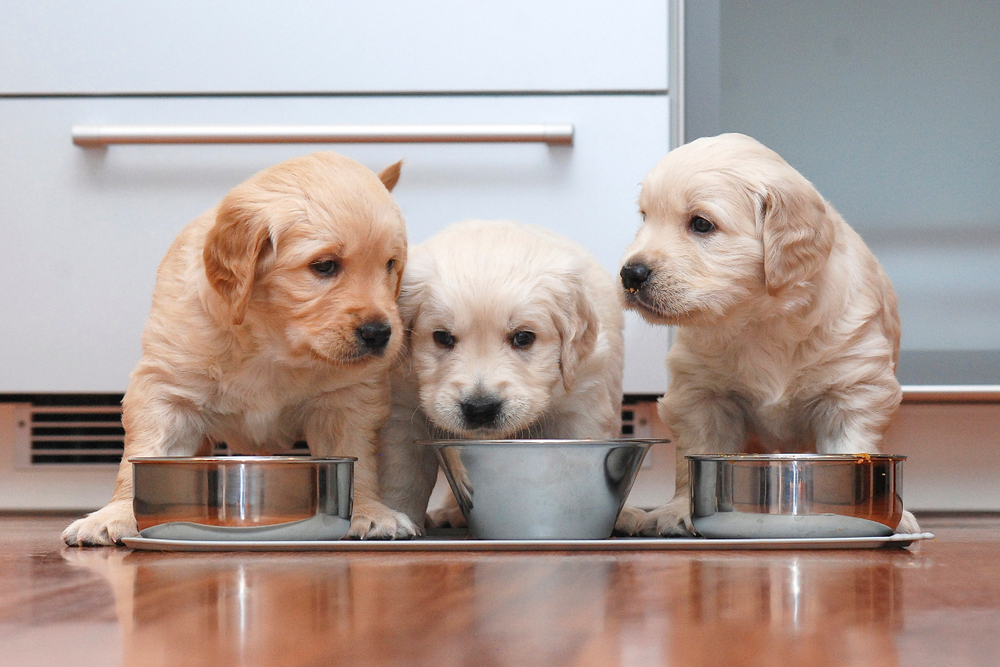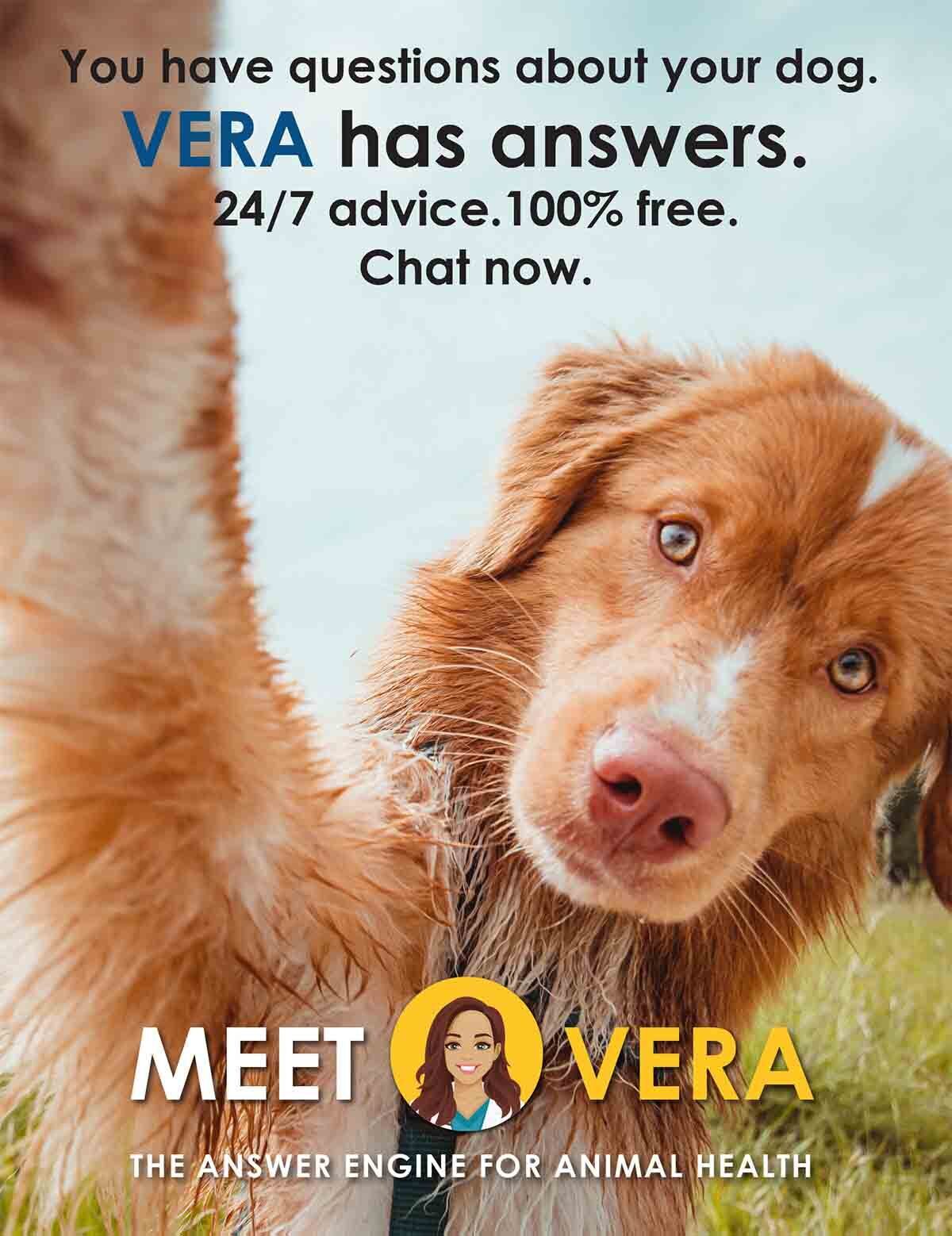Science Diet, Wellness, Royal Canin, Purina … large breed, small breed, breed-specific puppy food … OH MY! If you and your new pup get overwhelmed in the dog food aisle at the pet store, you are not alone! One of the most frequent questions we field as veterinarians is, “what type of food should I feed my puppy, and how much?” The number of options can make it very complicated for pet parents, but here are some useful tips that might help clarify the puppy food selection process. Choosing carefully is worth the time, as it is well-established that starting your puppy off with a balanced and complete diet will have a positive impact on their long-term health.
What Brand and Variety of Dog Food is Best for My Puppy?
There is a wide variety of dog food brands available, but how do you know which one is right for your pet’s nutrition? Aside from burning calories doing zoomies around the yard, puppies are busy building muscles, nerve tissue, bones and internal organs. Because of the rapid growth during their first 6-12 months of life, they require different nutrients than they will as adults. Finding a healthy dog food brand is one of the most important things you need for a puppy. It is essential that puppies are offered a balanced diet that is formulated and specifically labeled “for growth.” The optimal levels of protein, carbohydrate, phosphorus, calcium and DHA have been studied by veterinary nutritionists and extensively tested with respect to puppy growth and development. For these specific reasons, we do NOT recommend feeding a puppy formula that is labeled “for all life stages.”
To add another twist on the mission for the perfect puppy diet, large and giant breed puppies (Labs, Goldens, Danes) have different nutritional needs than small breed puppies (Yorkies, Miniature Poodles, Shih Tzus, or Pomeranians)! Large breed puppies tend to grow very rapidly, which can pose some growth-related bone and cartilage problems. The caloric density, along with mineral levels of phosphorus and calcium, are specifically dialed in to keep a large breed pup’s rate of growth ideal for healthy development.
Some brands of dog food, like Royal Canin, have gone a step further and created breed-specific formulations for puppies and adult dogs. These diets focus on the common breed-associated metabolic and growth needs for some purebred dogs.
How Do Veterinarians Know What Nutrients are Good for Puppies?
The Association of American Feed Control Officials (AAFCO) implements regulations and standardizes the recommended nutrient profiles for dog and cat foods. The National Research Council of the US National Academy of Sciences is the leading provider of nutrient recommendations for dogs and cats, and their publications formulate the AAFCO nutrient profiles. Board-certified veterinary nutritionists are also constantly studying the effect of diets on animal health. Since pet food labels can be difficult to read and decipher, the best way to certify that the puppy diet in question has been extensively studied and proven as nutritious is to look at the bag for an AAFCO statement. These statements will indicate that the puppy’s diet is formulated to meet or exceed the nutrient guidelines, OR that feeding trials following AAFCO guidelines have proven (even better!) that the diet provides good nutrition. Also, many brands of dog food will use words like “organic,” “natural,” “high protein” and “non-GMO” and these are largely a marketing appeal to pet owners and do not have any proven benefits.
One puppy diet type that veterinarians are cautioning against until further research is completed is the association of “grain-free” diets and a heart condition called Dilated Cardiomyopathy. Luckily, health problems related to consuming grain are extremely rare in dogs, so a balanced diet that includes grains is healthy and appropriate–without the risk of diet-associated heart disease.
Do I Choose Dry Kibbles or Canned Food for My Growing Puppy?
A common question veterinarians hear is, “Which is better for my dog–canned food or dry food? Does dry food help keep their teeth clean?” While there are some prescription dry foods for adult dogs that are specially formulated to reduce plaque and tartar, the reality is that other dry foods don’t do much to keep those pearly whites shining. Since the puppy kibble breaks apart when chewed, any benefit from the “brushing” action of kibble pieces is pretty minimal–so the canned versus dry debate is more about your pup’s preferences and what is convenient for your family.
If you decide to feed kibble, make sure the pieces are an appropriate size for your growing puppy’s mouth. Some small breed dogs require tiny kibble pieces (a feature of most “small breed puppy” formulations), and some short-nosed breeds, like Bulldogs, find it easier to eat specialized kibble shapes (like those found in the Royal Canin line of breed-specific puppy foods).
On the other end of the spectrum, if you have a large breed puppy, make sure the kibble pieces are large enough that they aren’t tempted to vacuum up the food all at once (and sometimes vomit!). It is best for their digestion if they eat slowly! You can also try feeding from a slow-feeder bowl or food puzzle to minimize this issue, too.
How Much Do I Feed My Puppy and How Often?
Just like the foods we eat, dog foods all have a different calorie count per cup of food, which means that there is no one-size-fits-all recommendation for the number of cups (or cans) of food your pup needs per day. So, how do you know what portion size is appropriate for your puppy?
Each package of food should have a puppy feeding chart on the packaging listing how much to feed based on their current age and weight or expected weight when they are fully grown. If you are having difficulties reading the puppy feeding guide, reach out to our vets on AskVet or your family veterinarian for some advice. Puppies grow quickly, so it’s also important to adjust the amount they eat per day along with increases in their current weight. In some large dogs, that means re-calculating their food every week!
To make sure your new puppy is maintaining a healthy weight and not becoming too thin or too chubby, you can evaluate their body condition score (BCS) at home.
And as far as the frequency of meals? When they first arrive home as adorable tiny little bundles of fluff and until they are about six months of age, veterinarians recommend feeding a breakfast, lunch and dinner to keep that battery charged up all day long. Once they reach six months of age, twice-daily feeding is adequate, although some dogs prefer to take their meals once a day! Feeding a puppy diet is recommended until they are about one year of age, and veterinarians also recommend large and giant breed puppies to continue their puppy diets through about 18 months of age due to the longer time it takes for them to reach maturity.
A word of caution, though: Any time a puppy’s diet is changed from one brand to the next, a slow transition over a minimum of 1-2 weeks is recommended to avoid stomach and intestinal upset due to new foods. Their stomachs are not adapted to varying diets like we are with our human food; find a high-quality food they love and stick with it.
Can I Feed My Puppy Treats?
As we all know, pups love treats – and we love treating them! How do you know what dog treats are healthy? It’s best to stick with products that are made in the USA, as there are more quality-control standards involved in the manufacturing of these products. When learning tricks, obedience skills, crate training your puppy and potty training your puppy, tiny “training treats” are designed to help you reward your dog and shower them with positivity. Try to keep your pup’s treats to 10% or less of their daily calorie intake, or they might start to decline their regular puppy food due to a treat-filled tummy. Too many treats can also lead to obesity and associated health issues.
Whenever you introduce a new treat to your puppy’s routine, make sure to watch for any signs of an upset stomach in case the treat doesn’t agree with them. If they have any diarrhea, vomiting or seem uninterested in their food, it may be that the new treat is too rich for them. Reach out to AskVet or your family veterinarian for advice and guidance.
What Foods are Dangerous or Toxic to My Puppy?
Although we consider our puppies to be members of our family, unfortunately, it is not safe for them to enjoy all of our foods with us! Common foods that we humans eat that are NOT safe for dogs include raisins, grapes, chocolate, xylitol (an artificial sweetener), garlic and raw meats. Meat bones also pose a risk of causing an obstruction in their stomach and intestines, so those are not recommended. If your dog has ingested any of these food items, or if you aren’t sure whether they may have, consult a veterinarian ASAP. We frequently help pet owners decide whether an issue is a true emergency or a close call!
Talk to a Trusted Vet
Next time you take your new puppy on a field trip to the pet store to replenish the food and snack bins, hopefully, you stride a bit more confidently down the food aisles armed with some new tips for identifying a healthy and complete diet for your puppy! AskVet and your family veterinarian are always wonderful resources for extra advice on the needs of your puppy too! Happy feeding… and growing!
Our AskVet Veterinarians are available to discuss all of your pet’s needs 24 hours a day, 7 days a week. Whether you have an immediate need or are looking to improve your pet’s overall wellbeing, just sign in to your account, and one of our friendly and knowledgeable veterinary experts will attend to your needs, no appointment required!
Written by:
Alexa Waltz, DVM
Dr. Waltz was raised near the beaches of Southern California but has spent her adult life living all over the beautiful United States while serving in the military and as a military spouse. She left California for the first time to pursue a career as a veterinarian at Louisiana State University School of Veterinary Medicine and graduated as a Doctor of Veterinary Medicine in 2006. She was accepted into the US Army Health Professionals Scholarship Program during vet school and upon graduation spent her military years as a veterinarian in San Diego working for the US Marine Corps and US Navy Military Working Dog programs as well as caring for pets of service members. After her military service, she became a civilian veterinarian and continued as a small animal general practitioner at clinics in California, Rhode Island, Colorado, and Maryland. Dr Waltz loves to see her “in person” patients just as much as communicating with and assisting pet parents virtually on AskVet. Dr Waltz is also a Mom to 3 humans, 2 guinea pigs, and 1 Australian Shepherd and in her spare time she loves traveling, adventures, exercising, and doing just about anything out in nature!
…and…
Allison Ward, DVM
Dr. Allison Ward grew up in the suburbs of Washington, D.C. and started working in veterinary hospitals when she was 14 years old. After graduating from veterinary school in 2011, she completed a small animal rotating internship in New Jersey, followed by a neurology/neurosurgery internship in Miami. After completing this advanced training, Dr. Ward then moved on to general small animal practice. Dr. Ward’s professional interests include feline medicine, neurology, and pain management. Her passion for educating pet owners carries over into her work with AskVet, and she loves being able to help pets and their parents at all times of the day (and night!). She currently resides in sunny south Florida with her two cats, Larry and George.






